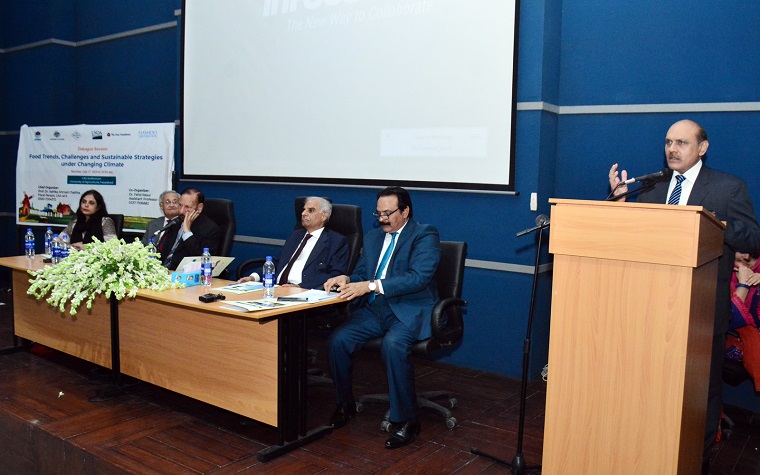
Experts of a consultative session on Food Trends, Challenges and Sustainable Strategies under Changing Climate stressed the need of coordinated efforts to address effectively multi-centric issues of water, energy and food security nexus in contrary to the growing population and depleting water and environmental resources.
The event was held at CAS Auditorium, University of Agriculture, Faisalabad in collaboration with Water Environmental Forum, HASHO Foundation and Asia Foundation. UAF Vice Chancellor Prof. Dr. Muhammad Ashraf (H.I.) said that water, energy, biodiversity, food and climate change were the global agenda items of all summits being held at international level. He told that China was growing maize in deserts with lesser amount of rainwater that we used to witness in potohaar region so we need to make such experiments that how we can grow wheat in such conditions. He was of the view that implementation on the regulations is a paramount concern that we are facing in this country is causing rampant malpractice in all fields particularly in agriculture. He said the water conservation in Barani areas is another frontier to be explored as during rainy season water needs to be stored at farm level by digging ponds with plastic surface so that stored water may not suffer seepage and be used during dry days. He urged the scientists to come out of the silos and work not only for earing impact factor but also to put an impact on the society based on their innovative techniques making the human life easier. He Former Sanitor Mr. Nisar A. Memon while describing the situation an outcome of multiple factors said that his organization bringing all stakeholders on board to strategize the future line of action. He told that they were holding dialogs that how we can make better coordination to deal with all three necessary elements of life with a holistic approach to make this a movement of awareness among the masses to taking care of water, energy and food as well. He said that our constitution provides the right of having food, water and energy to all citizens and we can ensure security of human beings if this nexus is properly addressed. He said that nexus of water, energy and food have complicity and interdependent to the human life and health. He underscored the need to have coordinated plan in the wake of population growth adding that during the last few decades Pakistan which had been facing water scarcity now been ranked as absolute country in terms of water scarcity. Dr. Riaz Hussain Qureshi said though Pakistan having one of the largest irrigation systems in the world, covering about 17 Mha of land but at the same time, it is considered one of the most inefficient systems wherein more than 60% water is lost either during conveyance in the channels or application in the field. Annually, 16 MAF water is lost in the canals, 26 MAF while travelling in watercourses, 17 in the field and 6 MAF in the distributary and miners. He said that out of 106 MAF delivery at head, only 41 MAF was being used in the field and the remaining water is lost due to poor irrigation methods and management system at canal to farm level. Highlighting the yield gap against per unit of water, he said yield gap is calculated 43.5 percent in wheat, 32, 72, 58, and 45 percent in cotton, sugarcane, maize and rice, respectively. He asked for introducing water pricing to arrest the growing trend of water wastage at domestic, industrial and agriculture. He said that National Water Policy lacks research so it should be added as priority area. He expressed his reservations on having a huge number of engineers in national water council and ignoring of agriculture professionals that, he emphasized to be added in the council. Focal person CAS-AFS Prof. Dr. Ashfaq Ahmad Chatha said that we have to take care of all precious commodities like water, energy and food thereby to make the human life safer and sustainable. He said rise in the temperature and heatwaves were putting enormous pressure and changes in late crop maturity that ultimately affects our grain quality. He emphasized the need of putting adaptation strategies in place as this year we witnessed delay in wheat harvesting from April 30 to May 30 due to continuous rainfall, which hampered the quality of wheat and profitability of the farming community. He told that previous century this country had 36 grains but today we left with only three crops so we need to have climate resilient crops to cope with the changing climatic conditions. Dr. Ali Touqeer Sheikh National program director Lead Pakistan, while talking about Pakistan in 2047: water and food security nexus in the changing climate, said that by growing and exporting the rice, water has been emerged as biggest export commodity through agriculture exports. Punjab Team Leader of Action on Climate Today Ms Sumaira Samad said that we feel fascinating during rainfall in May and June but we do not understand its drastic impact on quality of agricultural production. She said climate change is happening unpredictably without following previous trends so we need to prepare adapting strategies to meet with challenges of climate change. Dr. Masood Sadiq Butt, Dr. Muhammad Ashfaq, Dr. Allah Bakhash, Dr. Abid Mehmood, Dr. Nuzhat Huma, Dr. Farah Riaz, Dr. Fahad Rasul and Ms Rikza Javaid also spoke on the occasion.

